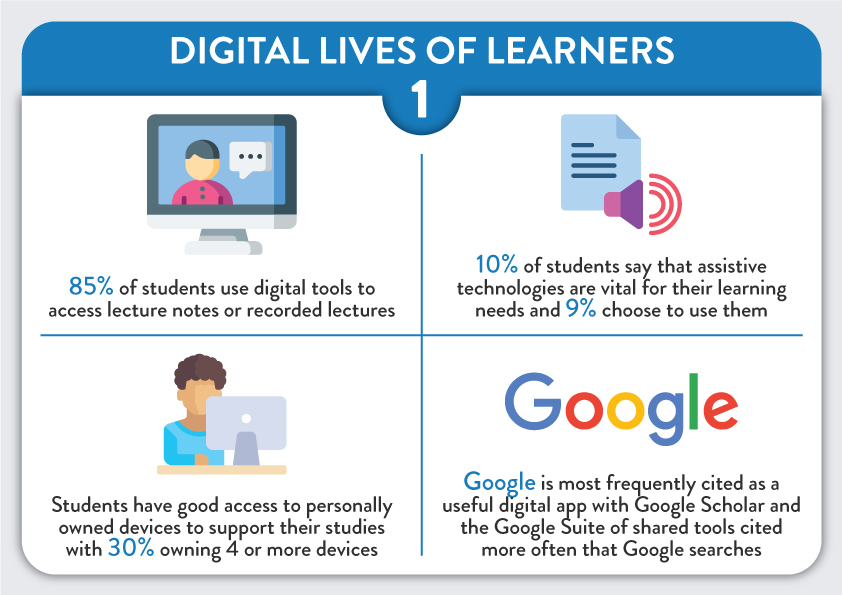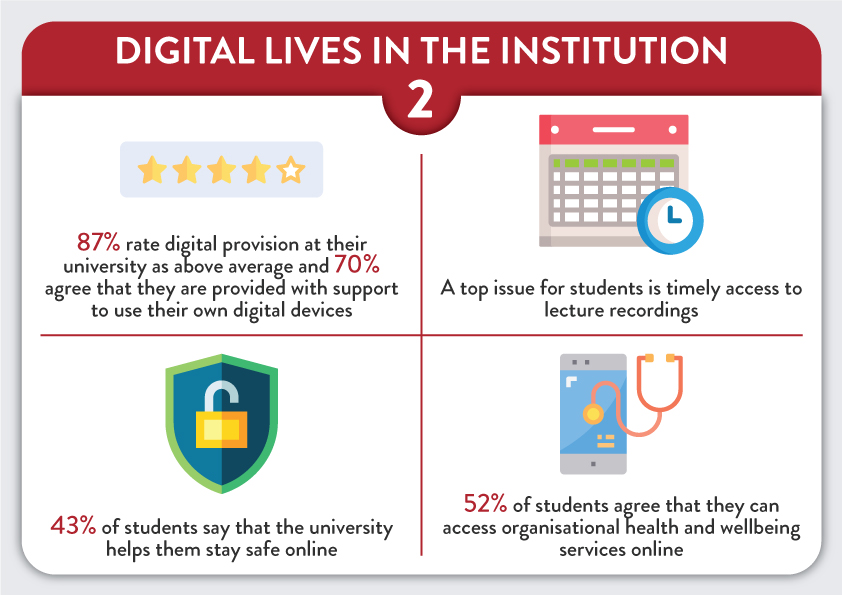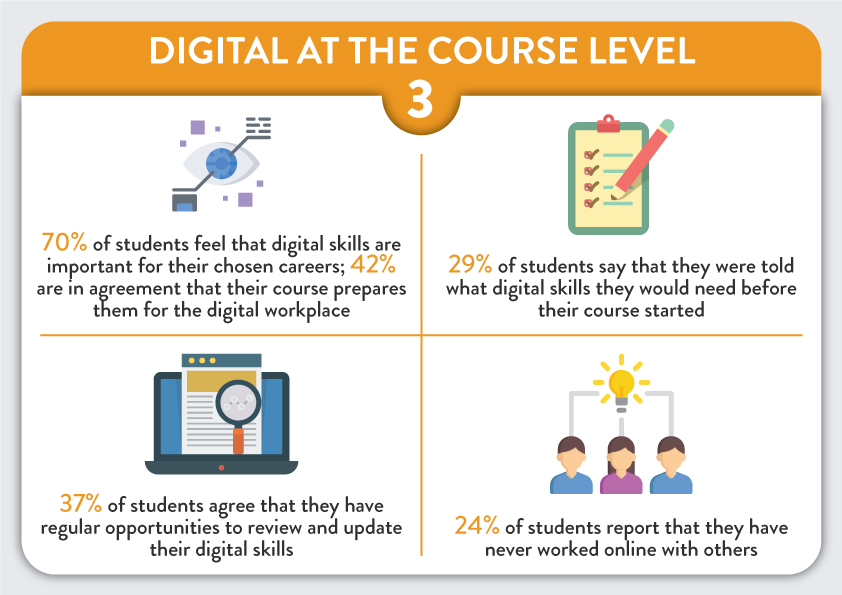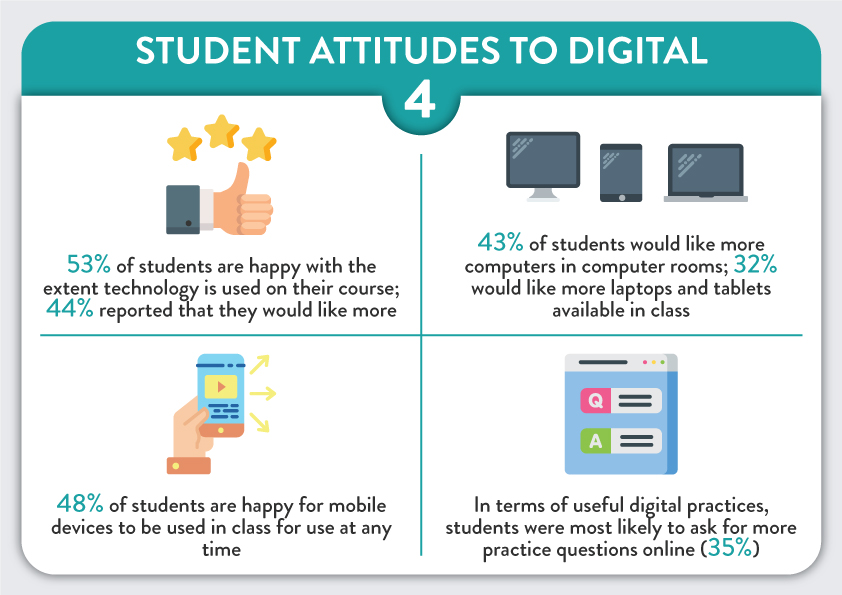Gaining Insights into the Student Digital Experience
The findings from the Student Digital Experience Insights 2019 Survey were launched last month at the ALT 2019 Conference held in Edinburgh. Queen’s University is a new member to the Jisc Insights service and while not included in these latest sector findings, will participate in the next data collection for the survey which for HE and FE students has just started this month. While reporting of the 2020 findings seem a long way off, we can still have a look at the HE sector data from this year and also monitor real time data when the survey is underway at Queen’s.
Joining the Jisc service happens at a time of change in the University where teaching and learning is evolving with the roll out of Canvas, the new virtual learning environment. So there has never been a better opportunity to start conversations about the digital experience of teaching and learning at Queen’s for staff and students, and to capture how this experience of the digital environment transforms over time.
Being able to understand the digital landscape of your organisation and be responsive to student and staff needs have never been more important.
Source: p. 7 Jisc Digital Experience Insights Survey 2019: findings from students in UK Further and Higher Education.

About the Student Insights Survey
Jisc’s digital experience service provides colleges and universities with meaningful, robust and actionable data which can be used to make a real difference to the student digital experience, prepare them for the future workplace and inform investment decisions.
Source: p. 7 Jisc Digital Experience Insights Survey 2019: findings from students in UK Further and Higher Education.
The Student Insights Survey enables organisations to gain a deeper insight into what makes a difference to learners in terms of their digital environment in teaching and learning. This includes an opportunity for students to rate their digital provision, voice their expectations about the use of digital services and technologies, empower them to explore what they think of their digital experience, and for organisations to find out both what is working well and what students want more of.
The student version of last years’ survey was administered across organisations between October 2018 and April 2019. Data was gathered from a total of 29,531 students (including students studying at 50 different FE colleges, 6th form colleges and universities across the UK). Of these, 49% were HE on campus students and 6% HE online. While the focus for us is mainly the HE sector it is useful (if you have time) to compare findings across sectors.
Taking a Snapshot of the 2019 Student Survey HE Sector Findings
If you are interested in reading the full report of the Student Digital Experience Insights Survey (HE Sector) it is in downloadable format.
At a glance findings from students in UK HE version are also available to download.
Alternatively, if you don’t have time to download either report from the Jisc website the following mini infographic encapsulates a brief visual summary of the key points from the findings with some highlights from across the 4 themes.




Attribution: Findings adapted from Jisc ‘At a Glance’ Digital Experience Insights Student Survey, 2019
What do the main findings say?
Overall in the HE sector, levels of satisfaction in terms of organisational digital provision of the quality of teaching and learning on courses is generally high.
While this is positive news, there are also areas of concern, including;
- Access to good digital resources. The availability of recorded lectures, otherwise known as lecture capture, is considered by HE students as necessary for study practice. This digital activity is reported as a top issue with expectations also surrounding more consistent audio quality of videos and upload timeliness. In addition, students would also like more key academic texts and readings to be in digitised format (p 52).
- Raising the awareness and articulation of the importance of digital skills. More support is needed to enhance students’ digital skills which will help them thrive at university, and within the workplace. This includes more work around embedding digital skills through curriculum design (prior to study, induction and throughout the course)
- Support for digital skills development and preparedness for the digital workplace. There is a disparity between students’ recognition of the importance of digital skills for future employability and how they feel courses prepare them for the workplace. Students would also like to know what digital skills are needed before the start of their course
- Use of digital technology. While some students are happy with the extent that technology is used in teaching and learning on their course, some still want more than is currently used
- More active promotion of digital health and wellbeing. Similar to the findings from the 2018 Student Insights Survey, there is a need to actively promote student health, wellbeing and safety in digital settings within the sector
- Managing students’ digital identity. There is a need to improve students’ understanding of how their personal data is being used and how to manage their digital identity. As part of digital literacy development this is something that Queen’s has already started to do. Recently, resources have been created to support staff and students with some tips about how to enhance their wellbeing and manage their identity online. In case you missed it, you can watch the video about Digital Identity and Wellbeing here.
The Student Digital Experience Insights Survey launch at Queen’s
This years’ Student Insights Survey will be running from October 2019 to April 2020 across UK HE and FE institutions. It is an opportunity for our students to be part of the drive to celebrate the digital experience at the university and/or also help to drive change to improve the Queen’s digital landscape.
The findings from the surveys support a process for engaging all users in shaping the digital experience and environment and are invaluable in helping organisations to drive change.
(Source: p. 22 Digital Experience Insights Survey 2019: findings from students in UK Further and Higher Education).

Queen’s will be able to work in partnership with students, listening to what they have to say and letting them shape the digital experience for themselves and future learners.
The Student Insights Survey will be launched at Queen’s in November, 2019 and will remain open for a few weeks (launch date to be confirmed). It is not an onerous survey for the students to complete with a short listing of around 20 questions. All questions focus around the 4 key themes outlined earlier – Digital Lives of Learners, Digital in the Institution, Digital at the Course Level, Student Attitudes to Digital. As an incentive for participation and completion, it is planned that students can, if they wish, enter a prize draw.
Prizes for Completion
The range of prizes will include:
1st Prize, 1 £100 Amazon voucher
2nd Prize, 2 X £25 Amazon vouchers
3rd Prize, 5 x £10 Amazon vouchers

To help, staff at Queen’s might want to:
- Encourage students to complete the survey. It will help staff to think about the digital experience and expectations of their learners and drive improvements at the University
- Engage your students with discussion around digital technologies while the survey is live
- Promote the use of the survey across the University, e.g., by talking about the sector HE findings with other staff
- Provide regular opportunities for your students to review and update their digital skills
- Look out for and participate with the teaching staff version of the Digital Experience Insights survey with a launch date to be confirmed in 2019/20. This will allow direct comparisons on many questions between students and staff providing a richer vision for digital provision at Queen’s.
To find out more about participation of the Student or Staff Digital Experience Insights Survey please contact: digitalinsights@qub.ac.uk